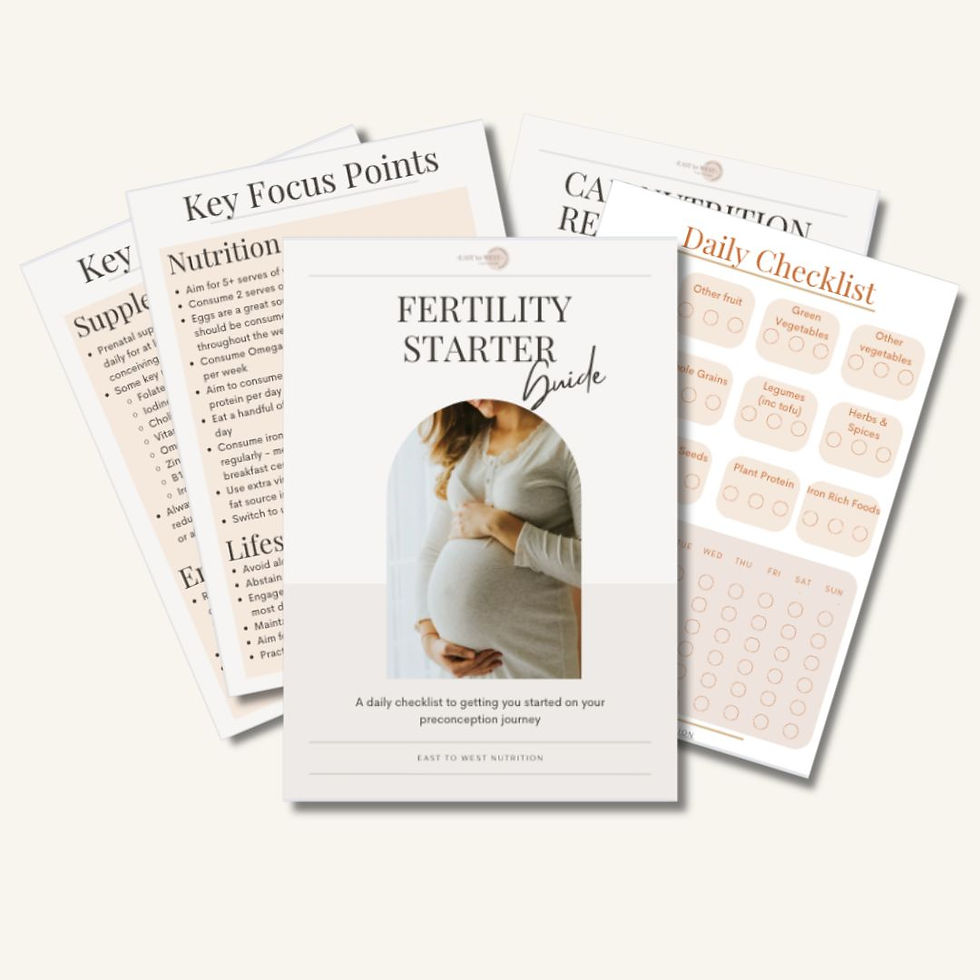Soy & Hormone Health
- Grace Armstrong
- Mar 24, 2023
- 3 min read
Updated: Aug 22, 2024
Oh, the old controversial soy. Rarely does one food divide so many people.

Some believe soy to be a hormone disruptor, fearing it causes breast cancer, impacts fertility or causes ‘man boobs’, and others embrace soy as a health food.
So, who is right, what does the science say? How does soy affect our hormone health- and should it be part of our fertility and pregnancy diet?
Let’s get into it!
MASTER YOUR EGG QUALITY MASTERCLASS
...Regardless of age, AMH or fertility history
What is in Soy?
Firstly, soy foods are made from the soybean- and can be consumed whole as edamame, mashed as tofu, fermented as tempeh, miso or natto, in liquid form as soy milk or processed usually as meat replacements or soy protein powders.
Soy contains a type of phytoestrogen called isoflavones which is similar to the structure and function of oestrogen (a sex hormone produced in both males and females) but with a much weaker effect (around 1000 times less), and doesn’t accumulate in our bodies, given they are metabolised quickly.
How Does Soy Impact Hormones?
Soy isoflavones can bind to oestrogen receptors in the body and cause either:
A weak oestrogen effect- when circulating levels of oestrogen are low
An anti-oestrogen effect when circulating levels of oestrogen are high
The ability of soy to mimic oestrogen by binding to receptors is what has led many people to avoid soy for hormone health. But actually, research has shown it can support excess oestrogen clearance through its anti-oestrogenic effect- which is particularly beneficial for those with PCOS or endometriosis.
The weak-oestrogen effect has also been shown to be beneficial for balancing hormones in perimenopausal women and can help reduce symptoms such as hot flushes.
So, if you’re neither perimenopausal, nor have an imbalance of oestrogen, can you still benefit from soy?
Absolutely, soy isoflavones are also an incredible antioxidant, that may support fertility health. Aside from their isoflavone content, soy foods are rich in nutrients that support our hormones and overall health, such as B vitamins, fibre, potassium, and magnesium and they are a complete source of protein (containing all 9 essential amino acids).
So, what about man boobs?

We’ve all heard of someone mention the man boob thing (gynecomastia) every time soy gets brought up, so what was that all about.
The one 60-year-old man who developed breast tenderness was drinking around 3L of soy milk EVERYDAY! – he also had elevated oestrogen levels! In science reviews, evidence shows there is no feminizing effect on men who consumed a moderate to high intake of soy. So no need to worry!
What form of soy is the best form of soy?
As you can imagine, soy sauce is not the same quality as tofu. So, it brings up the question, what are the best forms of soy, and which contains the most isoflavones? Because like everything, quality is important!
As you can imagine, the least processed forms of soy are better for you, soy milk, tofu, edamame, and fermented ones such as miso, tempeh and natto have the added benefit of supporting our gut health given they are rich in probiotics!
The recommendation is 4 servings of soy (around 25g) a day, and up to 50g has been shown to be protective against chronic diseases. And in terms of isoflavones, around 30 to 50mg is enough to offer health benefits!

1/2 cup of soybeans – 40 to 75mg isoflavones
¼ cup soy flour – 45 to 69mg isoflavones
250ml glass of soy milk- 15 to 60mg isoflavones
115g of tofu – 13 to 43mg isoflavones
110g block of tempeh – 41mg isoflavones
250g soy yoghurt – 26mg isoflavones
Teaspoon of soy sauce – 0.4 to 2.2mg isoflavones.
Do you have a dream of becoming pregnant but you don't know where to start?
Book a free discovery call and see how I can support your journey to motherhood
Are there any risks?
Obviously, if you have a soy allergy, it should be excluded from your diet!
Isoflavone supplements have also been shown to interfere with levothyroxine- a medication used for hypothyroidism.
And long-term use of isoflavone supplements may increase the risk of endometrial hyperplasia- which may lead to endometrial cancer- important to note, soy foods do not appear to have this effect.
Before you go, grab your FREEBIE!

The Fertility Starter Guide
An easy-to-action plan to get you started on your preconception journey
Subscribe and grab your copy for FREE



Comments